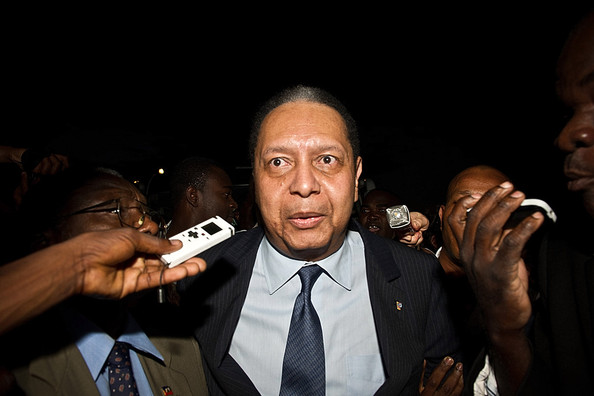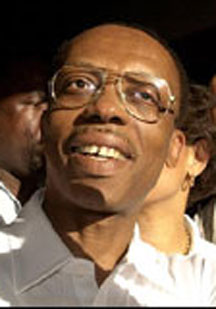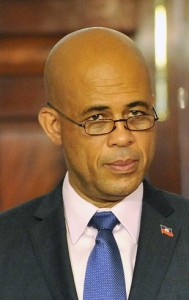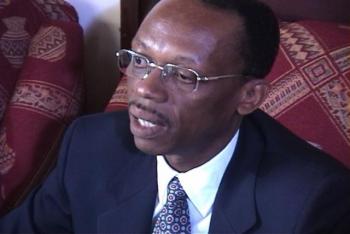By Melanie Newton
Stabroek News (Georgetown, Guyana), January 24, 2011
he governed as if he felt predestined to never die…
– Gabriel García Marquéz, The Autumn of the Patriarch, 1975
A week ago, Haitians the world over were stunned when former dictator Jean-Claude Duvalier returned to Haiti after 25 years of comfortable political asylum in France. This after a year of distress and humiliation, beginning with the January 2010 earthquake and ending with fraudulent elections that could leave Haiti without a government.

For many, this latest slap in the face for a traumatized people was too much – just when hell couldn’t get any hotter, the devil himself showed up to stoke the flames. Duvalier forced thousands into an exile from which they can never return, and the idea that he could walk freely in Haiti was beyond comprehension.
The precise forces behind Duvalier’s return remain a subject of debate, but most assumed that interests which have always thwarted democracy – namely the Haitian elite, the United States and France – were plotting to put Duvalier back in power. There certainly seemed to be a concerted effort to present the small crowd who greeted him at the airport (many of whom were likely paid to be there) as evidence of broad support for the supposed ‘order’ that Duvalier might bring.
But apparently not everyone in Haiti was party to plans to see him rehabilitated as a ‘legitimate’ political figure. On Tuesday Duvalier was arrested, and an investigation began that could see him answer in a Haitian court for his régime’s crimes. In contrast to several other powerful Haitians who have escaped trial, the Duvalier dictatorship’s record is hard to conceal. Thousands of people carry the evidence of his human rights abuses in their memories and on their bodies, and Haitian human rights lawyers have issued an international call for statements from Duvalierism’s victims. Duvalier might have a difficult time explaining the fact that uncounted numbers of Haitians vanished in his prisons. Despite the protestations of Duvalier’s legal advisor, there is no statute of limitations on human rights abuses.
Jean-Bertrand Aristide At Haitians’ expense, Jean-Claude and his wife Michèle Bennett enjoyed a very public lifestyle so obscenely lavish that they might have felt at home on the 1980s soap opera, Dynasty. Swiss authorities claim the Duvaliers embezzled anywhere from US$400 to $900 million. Michèle was apparently caught trying to flush evidence of financial misdeeds down the toilet when police raided their French residence some years ago.
For some Haitians, initial distress over Duvalier’s return has turned to quiet anticipation. After the failure of efforts to have him brought to justice in France for human rights violations, few thought they would ever see him tried in Haiti itself. This is a moment of hope that may yet prove fleeting, as justice might well be perverted by reactionary forces that do not seem to care what most Haitians think about anything. This has happened often enough for people to treat his arrest with guarded optimism.
Nevertheless, the moment is real, bringing with it the possibility that, for once, a dictator might get his just desserts, and he won’t enjoy the meal.
Duvalier’s return might bring another spectacular milestone for democracy and the rule of law. If a known dictator, whom everyone with a television set in 1986 could see was legitimately overthrown, can return to face the nation, then what about Jean-Bertrand Aristide, the country’s exiled but democratically-elected leader, who also wants to go home? Duvalier does not currently possess a valid Haitian passport. It is not even clear if he is still a Haitian citizen. No one should believe French claims that they were unaware he was traveling to Haiti – if this were true, then France’s allies in the ‘war’ against post-911 terrorism should be very nervous.
Many Haitians and outside observers of all political stripes justly worry that the resurgence to public notice of Haiti’s two most polarizing political figures comes at a dangerous moment. The presence of Duvalier and Aristide in Haiti would raise the stakes in a desperate political situation, and the lives of many Haitians could hang in the balance. Neither man, in and of himself, offers the solution to Haiti’s crises. But repeatedly subordinating justice and the law in favour of what is supposedly “best” for Haitians is a hallmark of Duvalierist elitism, and plays right into Duvalier’s hands.
Jean-Claude Duvalier
Similar predictions of imminent civil war in, for example, early 1990s South Africa during apartheid’s collapse proved unfounded, in part because that transition happened in a public fashion, and efforts were made to ensure that the post-apartheid South African state truly had the capacity to govern the country. In Haiti, no less than South Africa, democracy and transparency should not be compromised due to fear of a conflict that does not have to happen.
The real issue is that neither Duvalier not Aristide should ever have left Haiti in the first place. Not even his staunchest opponents can give a sound legal reason why Aristide is barred from returning. The U.S. State Department, the agency ultimately responsible for removing both Duvalier and Aristide from Haiti, says only that Aristide’s return is the “last thing” the country needs.
No credible evidence exists that his régime came anywhere close to the brutality and corruption of Duvalier. Clearly, the reasons for Aristide’s exile from his own country are political, and, by moral or international standards, completely illegal and undemocratic.
In 1986, the U.S. ignored calls for a fair judicial process in Haiti against the Duvaliers, claiming that it was best for stability if they fled. The U.S. and France spirited him out of the country and protected him from having to face the justified wrath of his people. Conveniently, this meant that no damaging secrets that might implicate the U.S. government would come out at his trial.
Allowing the Duvaliers to defend themselves publicly would have revealed that, since the Nixon administration, the Duvalier government was almost entirely bankrolled by U.S. dollars. This support paid for the policies that cost many their lives and forced hundreds of thousands of Haitians into exile.

President Aristide, a leader with a real democratic support base, posed a different problem. Starting with the Clinton administration, the policy was to appear to work with him while undermining his democratic credibility. This began in 1994, when the Clinton administration restored him to power (after the first Bush government backed a 1991 military coup that forced him from office). Clinton brought Aristide back via a highly public and wholly unnecessary ‘U.N’ mission that Haitians knew was a cover for U.S. occupation. This decision was intended to, at best, confuse Haitians about Aristide’s intentions, and, at worst, alienate him from his supporters. At the same time, the Clinton administration made Aristide sign an IMF structural adjustment plan that left him more or less unable to carry out the reforms for which he had been elected.
Sadly for the forces of Western dominance, even this was not enough – Aristide remained popular, and in 2000 he was returned to office with a large majority in elections that foreign observers said were fair, but which the U.S. government denounced anyway. At this point, the Americans inaugurated one of the most creative policies of modern economic imperialism. In contrast to the generous financing of the Duvalier régime, the U.S. began transforming Haiti into “the republic of NGOs,” depriving the government, dependent since the era of Jean-Claude on foreign aid and loans, of the funds needed in order to run the country.
Foreign aid organizations are now a corrupt shadow of the real Haitian state, apparently accountable to no one for the efficiency with which they dispense aid. The NGO-model’s failure to provide services that are basic human rights has been made abundantly clear since the earthquake. A natural disaster has been transformed, through foreign mismanagement, into conditions so appalling that Haiti is experiencing a cholera epidemic of a scale not seen in the Caribbean since the 19th century.
By January 2004, people took to Haiti’s streets, demanding that Aristide find a way to implement the reforms for which he had been elected. As in 1986, this was an incredible instance of democracy, only in this case, people demanded that the government live up to its promises. In a cynical move, Haitian elites and foreign governments saw an opportunity to fix their ‘Aristide problem’.
The Americans, France and Canada financed a campaign to represent the protests as signs of imminent state collapse, and backed former Haitian military leaders who invaded Haiti from across the Dominican border. In the dead of night at gunpoint on February 29 2004, foreign troops forced Aristide into exile. Unlike Duvalier, Aristide went against his will, despite efforts to pretend that he had willingly signed a letter of resignation. Since then, every effort has been made to destroy the popular political movement he led, using the fact that its leader is exiled to prevent its candidates from running in elections.
Weak attempts are made to give the impression that the Préval government chooses not to allow Aristide back. In reality, this is an occupied government with almost no control over its domestic or foreign policy. Préval’s refusal to allow Aristide into Haiti is a decision dictated by Paris and Washington.
No Haitian leader has really been able to run Haiti without constant foreign manipulation since the U.S. takeover of Haiti’s economy in the early 1970s. The extreme nature of Haiti’s economic isolation is evident from a comparison with its Caribbean neighbours. Out of CARICOM’s 14 member states, which Haiti joined in 2002, Haiti is the only one that has no trade at all within the Caribbean. Its economy is a U.S. satellite, and most of the state’s social functions have been usurped by ineffective and corrupt NGOs.
Prioritizing ‘security’ and supposed ‘stability’ over democracy and the rule of law will not make life better for Haitians. Ultimately, Haitians should decide the futures of Duvalier and Aristide, as they tried to do in 1986 and 2004. Haitians’ fears about what could happen if the playboy and the priest both return to Haiti should be taken seriously. If conflict does result, then the responsibility lies squarely with the U.S, France, Canada, and the U.N mission. For these manipulative interest groups, the worry is ultimately that an order designed in the interests of foreign governments, foreign agencies and a tiny minority in the Haitian elite, will be upset by a public reckoning with injustice.
Melanie Newton is Associate Professor of History at the University of Toronto, Canada




